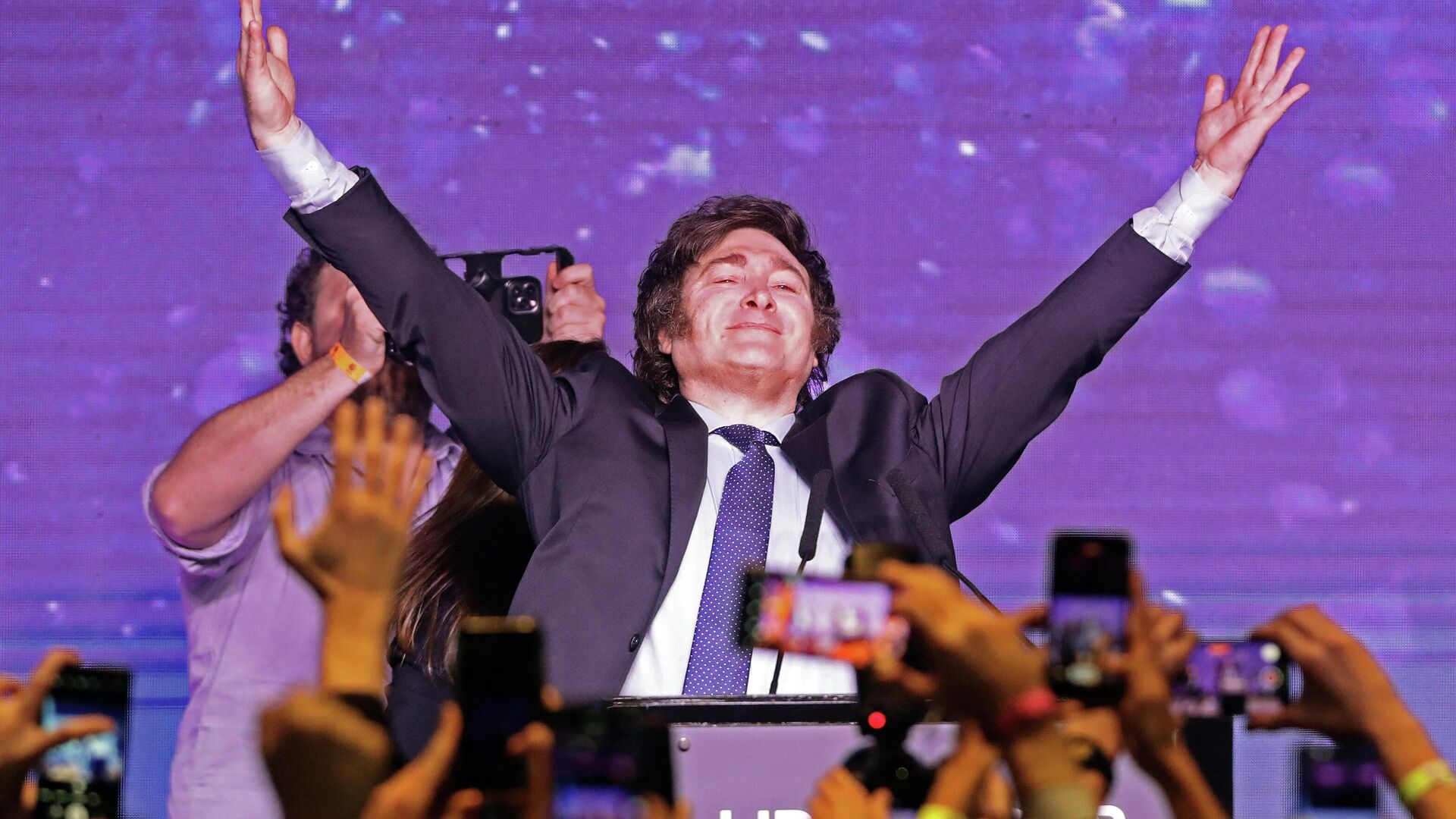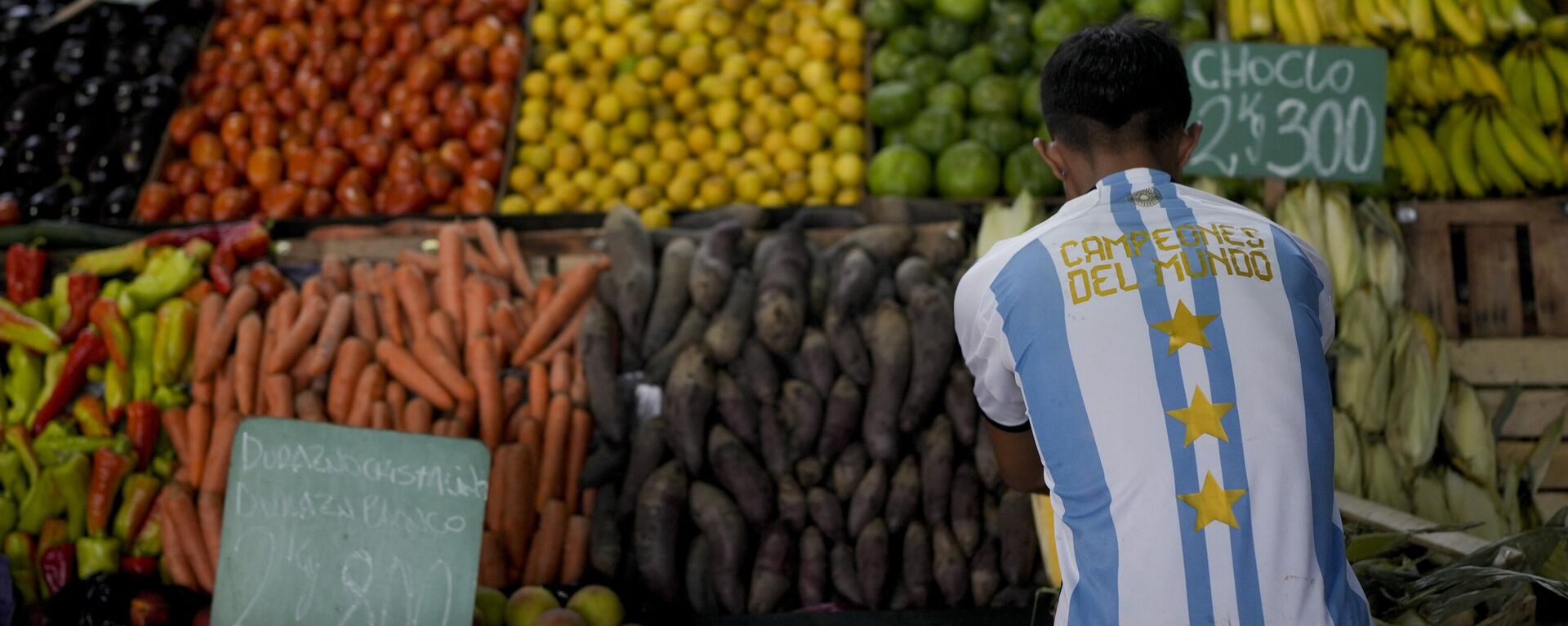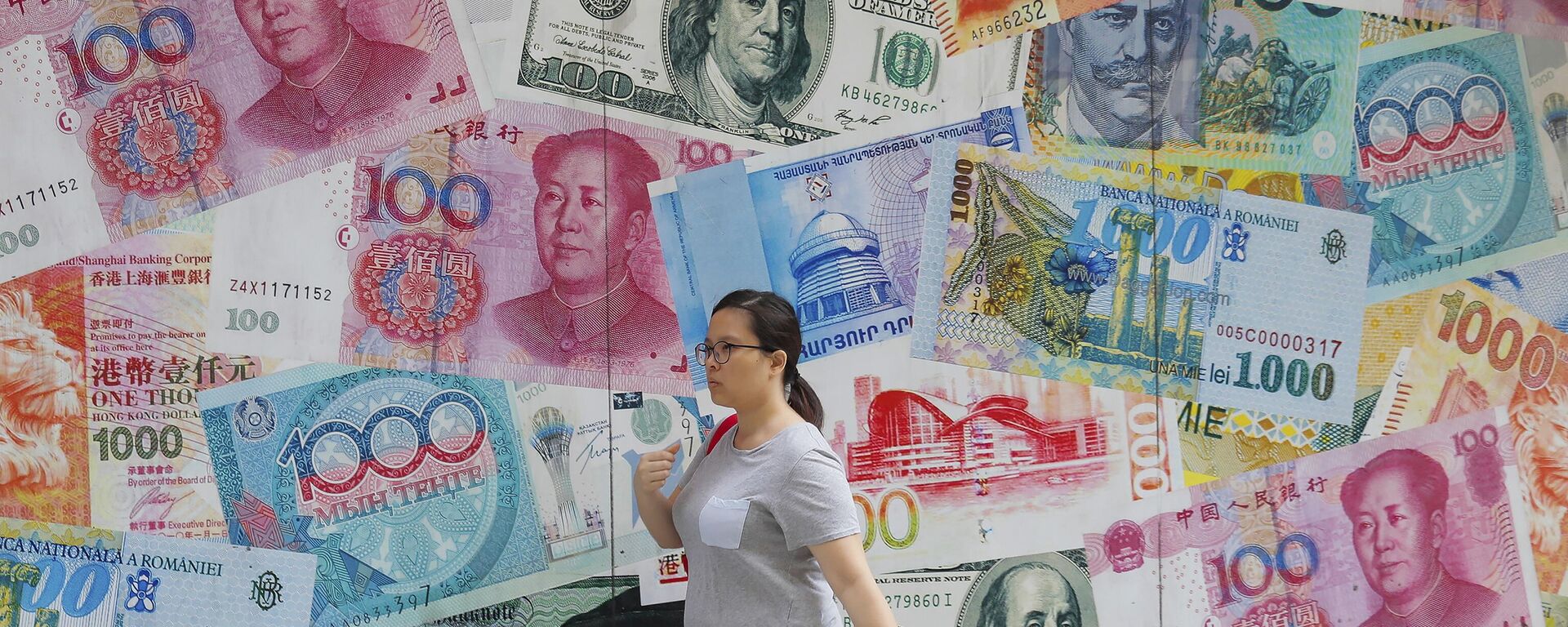https://sputnikglobe.com/20230819/argentine-presidential-candidate-milei-could-win-presidency-in-potential-runoff-election-1112721007.html
Argentine Presidential Candidate Milei Could Win Presidency in Potential Runoff Election
Argentine Presidential Candidate Milei Could Win Presidency in Potential Runoff Election
Sputnik International
Argentine far-right libertarian economist and presidential candidate Javier Milei is unlikely to win in the first round of this fall’s presidential election but could potentially get elected in a run-off, experts told Sputnik.
2023-08-19T04:15+0000
2023-08-19T04:15+0000
2024-03-11T10:58+0000
analysis
argentina
hyperinflation
pedro castillo
peru
international monetary fund
latin america
election
https://cdn1.img.sputnikglobe.com/img/07e7/08/13/1112720850_0:143:3136:1907_1920x0_80_0_0_c9226f0402fcac6c862937c8298b792c.jpg
Argentina's presidential election is scheduled for October 22. The main contenders for the presidency are Economy Minister Sergio Massa running for the ruling Union for the Homeland party, and opposition politicians, including former security minister Patricia Bullrich, Buenos Aires mayor Horacio Larreta and Milei. After the primary votes were counted, La Libertad Avanza (LLA, Advanced Liberty) movement leader Milei received about 30%, followed by Bullrich and Larreta, who represent the Juntos por el Cambio (Together for the Change) coalition, who together received about 28% of the vote. Massa and his colleagues in the ruling party received about 27% of the vote. Runoff Election Most LikelySuch an unexpected development is likely tied to a deep economic crisis, with inflation rate exceeding 100% earlier this year and annual inflation expected to top 140%. In addition, having spent its international reserves, Argentina must pay its multibillion-dollar debt to the International Monetary Fund (IMF). According to Anibal Perez-Linan, professor of political science and global affairs at the University of Notre Dame, Milei’s victory shows the voter’s skepticism toward politicians as well as their desperate search for new choices. Ignacio Arana Araya, assistant professor at the Institute for Politics and Strategy at Carnegie Mellon University, also believes Argentina will probably have a second round due to the country’s balance of power among political blocs. "The most likely scenario is a runoff election in November because the country is divided into three coalitions that enjoy similar levels of support. Milei could win in the runoff elections, but that is still highly uncertain," Arana Araya explained. Meanwhile, Juan Javier Negri Malbran, a professor at the department of political sciences and international studies at Universidad Torcuato Di Tella in Buenos Aires, pointed to several issues that could potentially cost Milei the presidency. Outsider DilemmaHowever, even if Milei manages to find himself in the presidential seat, the question remains whether he'll be able to implement his proposals - which include abolishing the country’s central bank and adopting US dollar as national currency, since he lacks institutional support. If his party repeats the primary’s success in the general election, it stands to have about 40 seats in the 257-sear lower house and eight seats in the 72-seat upper house. This sentiment was echoed by Arana Araya, who expects a Milei presidency to fail similarly to other political outsiders who managed to win power. "Research has shown that outsider presidents lead to more executive-legislative conflict and institutional paralysis. Recent cases are illustrative. Pedro Castillo of Peru was also a populist outsider that in 2022 ended up impeached and today is in prison. Besides being an outsider, Milei is a far-right populist like former Brazilian President Jair Bolsonaro, who led a highly polarizing government and today faces a trial for abusing his power," Arana Araya continued. Negri Malbran is similarly skeptical of Milei’s chance to implement his political and economic program. "He is very unlikely to push forward his agenda; he is in an extremely weak institutional position. Either he pacts with the political class he despises or he will be a very paralyzed president," Negri Malbran said.
https://sputnikglobe.com/20230314/argentinas-severe-inflation-rate-surpasses-100-for-first-time-in-over-30-years-1108400918.html
https://sputnikglobe.com/20230701/dedollarization-accelerates-as-argentina-makes-imf-payment-using-yuan-1111605999.html
argentina
peru
Sputnik International
feedback@sputniknews.com
+74956456601
MIA „Rossiya Segodnya“
2023
Sputnik International
feedback@sputniknews.com
+74956456601
MIA „Rossiya Segodnya“
News
en_EN
Sputnik International
feedback@sputniknews.com
+74956456601
MIA „Rossiya Segodnya“
Sputnik International
feedback@sputniknews.com
+74956456601
MIA „Rossiya Segodnya“
javier milei, argentina, argentine presidential election 2023,
javier milei, argentina, argentine presidential election 2023,
Argentine Presidential Candidate Milei Could Win Presidency in Potential Runoff Election
04:15 GMT 19.08.2023 (Updated: 10:58 GMT 11.03.2024) MOSCOW (Sputnik) - Argentine far-right libertarian economist and presidential candidate Javier Milei is unlikely to win in the first round of this fall’s presidential election but could potentially get elected in a run-off, experts told Sputnik in the wake of Milei's surprising victory in the presidential primary.
Argentina's presidential election is scheduled for October 22. The main contenders for the presidency are Economy Minister Sergio Massa running for the ruling Union for the Homeland party, and opposition politicians, including former security minister Patricia Bullrich, Buenos Aires mayor Horacio Larreta and Milei.
After the primary votes were counted, La Libertad Avanza (LLA, Advanced Liberty) movement leader Milei received about 30%, followed by Bullrich and Larreta, who represent the Juntos por el Cambio (Together for the Change) coalition, who together received about 28% of the vote. Massa and his colleagues in the ruling party received about 27% of the vote.
Runoff Election Most Likely
Such an unexpected development is likely tied to a deep economic crisis, with inflation rate exceeding 100% earlier this year and annual inflation expected to top 140%. In addition, having spent its international reserves, Argentina must pay its multibillion-dollar debt to the International Monetary Fund (IMF).
According to Anibal Perez-Linan, professor of political science and global affairs at the University of Notre Dame, Milei’s victory shows the voter’s skepticism toward politicians as well as their desperate search for new choices.
"I think, however, that Milei’s aggressive style will alienate part of the electorate, so it is very unlikely that he will win in the first round. He could win by splitting the right-wing vote in the first round, defeating the other contender on the right, Patricia Bullrich, and eventually winning against the Peronist candidate in the second round. But this is far from guaranteed," Perez-Linan said.
Ignacio Arana Araya, assistant professor at the Institute for Politics and Strategy at Carnegie Mellon University, also believes Argentina will probably have a second round due to the country’s balance of power among political blocs.
"The most likely scenario is a runoff election in November because the country is divided into three coalitions that enjoy similar levels of support. Milei could win in the runoff elections, but that is still highly uncertain," Arana Araya explained.
Meanwhile, Juan Javier Negri Malbran, a professor at the department of political sciences and international studies at Universidad Torcuato Di Tella in Buenos Aires, pointed to several issues that could potentially cost Milei the presidency.
"At this point, indeed, it seems that Milei has the greater probability of becoming the next president. It is yet to be seen if he might lose some steam in the following two months as his radicalized proposals drive away some voters or if voters [are] afraid of his triumph act strategically," the expert suggested.
However, even if Milei manages to find himself in the presidential seat, the question remains whether he'll be able to implement his proposals - which include abolishing the country’s central bank and adopting US dollar as national currency, since he lacks institutional support.
If his party repeats the primary’s success in the general election, it stands to have about 40 seats in the 257-sear lower house and eight seats in the 72-seat upper house.
"If Milei wins, I think it would be very hard for him to implement a radical agenda of change. His party would not have a majority in Congress, and he would have to form a legislative coalition with Juntos por el Cambio, which is itself a moderate right-wing coalition," Perez-Linan said.
This sentiment was echoed by Arana Araya, who expects a Milei presidency to fail similarly to other political outsiders who managed to win power.
"Research has shown that outsider presidents lead to more executive-legislative conflict and institutional paralysis. Recent cases are illustrative. Pedro Castillo of Peru was also a populist outsider that in 2022 ended up impeached and today is in prison. Besides being an outsider, Milei is a far-right populist like former Brazilian President Jair Bolsonaro, who led a highly polarizing government and today faces a trial for abusing his power," Arana Araya continued.
Negri Malbran is similarly skeptical of Milei’s chance to implement his political and economic program.
"He is very unlikely to push forward his agenda; he is in an extremely weak institutional position. Either he pacts with the political class he despises or he will be a very paralyzed president," Negri Malbran said.




